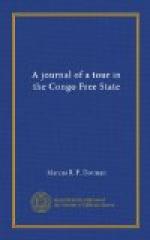On August 3rd we cross the Equator marked by a post on one side of the river and the point of an island in the centre. Here used to be a settlement, but most of the people have moved higher up. There is still a Mission near the place and a good road runs along the bank between plantations of bananas and gardens to Coquilhatville which we reach in the afternoon.
[Illustration: BOTANICAL GARDENS AT EALA.]
CHAPTER IV.
The Equator District.
Coquilhatville, the capital of this important District is the largest town in the Upper Congo. The roads are formed by bamboos laid in rows, upon which sand and mud are placed the whole forming an effective pavement for foot passengers and no other is required for there are no carriages and only a few horses. All the officers don white uniforms with full dress, badges and medals, and together we proceed to make a formal call on Captain Stevens, the Commissaire of the District with whom is staying Mr. Malfeyt, Commissaire du Roi. Some of the officers take their dogs with them, which at once make a furious onslaught on the numerous cats of the Commissaire and have to be suppressed. Mgr. Derikx places a particularly pugnacious fox-terrier under the basket work of his chair the little animal being literally sat upon by the dignitary of the Church.
The Residency is a large brick building situated on a low hill and raised above the ground, the space beneath being enclosed and loop-holed, thus forming a small fort. The gardens are particularly pretty and well kept. Beer is handed round and we sit chatting on the verandah until Mr. Grenfell, the head of the Baptist Mission, arrives. He has travelled up the river in the Mission Steamer from Bolobo and was on his way when we stopped at that place. As he has been in the Congo for more than twenty years, he knows the country well and thus speaks with authority. He thinks the system of Government excellent, but that it is administered better in the Lower than the Upper Congo, because there are not enough officials in the latter. He is convinced the population has greatly decreased on the riverside of the Bangala District, and attributes it chiefly to Sleeping Sickness for he cannot say if emigration to the French Congo has been extensive or not. No case of ill-treatment of natives has come to his notice during the last three years, but he thinks the State does not give them enough work to do. He has seen natives without hands, but does not believe that any atrocities have occurred for many years. Generally speaking, he thinks it would be better if the State acquired all the property of the Companies. Although he does not know of any definite cases of ill-treatment, he has heard reports and thinks there is “no smoke without fire.” However, he is quite prepared to agree that a very little fire in the Congo makes a great deal of smoke. Altogether, Mr. Grenfell spoke very calmly, and is evidently not carried away by emotionalism or strong prejudice against the State.




